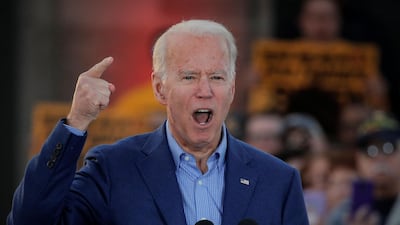Investors are nervous as global markets brace for the possibility of a drawn-out US presidential election and a gridlock in Congress, which will reduce the odds of a second Covid-19 fiscal stimulus to boost the country's ailing economy, analysts said.
The Dow Jones on Monday plunged 2.29 per cent after House Speaker Nancy Pelosi and US Treasury Secretary Steven Mnuchin again failed to reach a third stimulus deal amid soaring Covid-19 cases in the US.
“This is why we experienced an intraday drop of 900 points for the Dow Jones yesterday," Naeem Aslam, the chief market analyst at Avatrade, said on Tuesday. "The renewed surge in coronavirus cases have made investors even more anxious.”
Steen Jacobsen, chief investment officer at Saxo Bank, said the most likely result will be a contested election result that will lead to a period of uncertainty and market volatility.
“If neither side is accepting a loss, we may experience a period of uncertainty between the election date on November 3 and the inauguration day on January 20, which could lead to market volatility, but the longer term outlook remains broadly the same," Mr Jacobsen said.
With just one week to go before Americans vote on November 3 and former vice president Joe Biden continuing to lead national polls, Bank of Singapore said the stimulus relief bill will not be passed until February 2021.
“Under a Mr Biden win and blue-sweep scenario, assuming a Covid-19 relief stimulus package is not passed before the election, we expect a relief package of about $2 trillion to be passed in February 2021,” Eli Lee, head of investment strategy at Bank of Singapore, said in a research note.
If President Donald Trump retains the US presidency, the bank expects the status quo to prevail.
“We expect a relief stimulus package after the election that is even smaller than under a Mr Biden presidency with gridlock, given that the Republican Senate is proposing only $500 billion currently,” said Mr Lee.
John Hardy, head of FX Strategy at Saxo Bank, said both sides are playing partisan politics and had delayed support for the unemployed and industries hit worst by the coronavirus crisis.
"At best, this has taken steam out of a recovery and at worst, it means we are already risking a second dip and more major 'scarring' of the economy as businesses go under, which will only worsen if no major further support programme is forthcoming until after the new administration is in place in late January,” Mr Hardy said.
While the luxury retail sector could see headwinds, the high minimum wage and large relief stimulus proposed by Mr Biden will be positive for consumption spending, Conrad Tan, an investment strategist at Bank of Singapore, said. However, growth of big tech companies via mergers and acquisitions could slow and there could be more regulatory changes to exert pressure on drug/biotech and managed care industries.
“On US-China tensions, we see Mr Biden taking a less capricious and more strategic approach involving US allies, which will be less unpredictable for China and investors,” Mr Tan said. “That said, tensions are likely to remain high as the issues of fair trade, intellectual property protection and human rights are structural and not specific to Trump or Republicans.”
Both candidates are likely to support but not stimulate the economy, and Mr Biden's proposed higher capital gains tax could pressure the S&P500 at a cost of about 10 per cent on earnings, Saxo Bank's Mr Jacobsen said.
He added that higher volatility and inflation are the two fundamental risks to markets and he expects them to become a reality. "Higher inflation will be seen because consumers are spending less on travel and holidays during the pandemic, and more on consumer goods," he said.
"We are seeing monetisation of debt with central banks buying government-issued debt, and we are creating a moral dilemma whereby a virtuous support cycle is producing bad policy.”
The Bank of Singapore expects a weaker US dollar under a Biden administration because of twin deficits in play and Federal Reserve interest rates staying at ultra-low levels for a sustained period. Emerging markets, in particular, will benefit from a weaker dollar, continued growth momentum in the US and a solid recovery in China, it added.
However, Mr Hardy said he expected the US dollar to do well even under the more volatile and chaotic election scenarios. "Historically, the USD trades strongly on chaos and the Fed is experienced at managing such scenarios, avoiding super-spikes in price.”

































